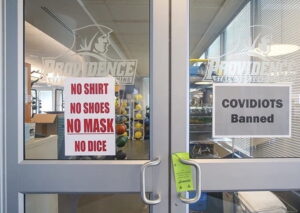Tag: Tara Cooney ’21
Ahead of the Curve: PC’s Return a Success
by Kyle Burgess on September 3, 2020
Campus
by Eileen Cooney ’23
News Co-Editor
With COVID-19 cases still surging across various parts of the United States and colleges plowing ahead with their fall reopening plans, many students and parents rightfully have trepidations about the Providence College campus reopening. Within just one week of reopning, the University of North Carolina at Chapel Hill cancelled in-person classes and switched to remote learning for the rest of the semester following an explosion of cases and a 31% positivity rate linked primarily to large off-campus gatherings. Similarly, the University of Notre Dame was forced to cancel all in-person classes for two weeks after they reached a peak positivity rate of 22.2%. The data and statistics coming from other universities have undoubtedly left PC students worried about the upcoming semester.
If there is any consolation to those returning to PC’s campus, it seems to be the robust testing policy the College has implemented in hopes of preventing large outbreaks that have been seen at other colleges across the country. Per the emails sent out by administration, students have been required to receive a point-of-origin test with a negative result three to five days before moving onto campus, and to be tested again upon their arrival to campus.
Many students have voiced their concerns about these protocols, as testing across the United States is not as rapid as many have claimed it to be, particularly in the New York, New Jersey, and Connecticut areas. While testing is available at some CVS pharmacy locations, it can take six to 10 days for results to come back for students living in these states. Katherine Cleary ’23, a resident of Rochester, New York said, “Getting an appointment for a test was very easy, but I was stressed out about getting the results back in time. Though Providence is offering testing on campus for students before they move in, this was not an option for me as I live over six hours away.”
Despite the challenges many are facing getting tested off-campus, a lot of students are praising the College’s on-campus testing system. Matthew Petry ’21 said, “getting tested was such a simple, streamlined process. It was no hassle at all.” Similarly, Tara Cooney ’21 also said, “the on-campus testing was as simple and easy as could be.”
Despite this, Cooney also voiced her concerns about the College’s quarantining protocols, particularly for students living off-campus. She said, “the school has been very clear about cracking down on off campus gatherings and the emphasis on tests, yet I don’t understand the actual logistics of what happens when someone in an off-campus house gets COVID-19. Are we allowed to use the quarantine facilities on campus or is it up to us to find accommodations? If it is up to us, what are the best practices? I think it would be helpful if the school came out with a document clearly laying out the best practices, so there is no ambiguity about what students can do and what they can’t do. It would really take away a lot of stress and pressure students are experiencing.”
According to the College’s testing dashboard, the percentage of positive cases hovers below 1%, which is comparable to the state of Rhode Island’s overall positivity rate. However, it remains to be seen whether and when a larger outbreak could occur. In the meantime, students in Friartown remain hopeful that they will be able to stay on campus until Thanksgiving.

Welcome to the 21st Century: Technology’s Place in PC Classrooms
by The Cowl Editor on February 27, 2020
Campus
by Eileen Cooney ’23
Assistant News Editor
Although it is not a universal policy that computers and other devices are not allowed to be used during Development of Western Civilization classes, most of the professors who teach the course implement policies that bar technology from being used for learning purposes.
The prohibition of technology in the classroom can be difficult for students who prefer to type notes on a tablet or a computer rather than handwrite them, or to ensure that the important points of a fast-paced lecture are written down.
Additionally, many students find it helpful to transfer their notes to a digital PDF study guide that is easy to review before exams. A typed outline of one’s notes can be more concise and clear to study from rather than a messy, unorganized, handwritten notebook.
Despite the obvious benefits of being able to use a laptop or tablet to take notes, these devices have nonetheless been barred from use in most DWC classes due to their distracting nature.
Dr. Stephen Lynch, professor of English and head of the Liberal Arts Honors program, says that he does not allow technology to be utilized in his classes because “if a student receives an email or some other notification it is just too tempting for them to go off task and check it.”
Additionally, he cited various studies that demonstrate that students retain information better when they handwrite their notes because they are forced to be more selective in what they take down. Since they cannot write down their notes nearly as fast as they can type, a student is forced to spend more time processing the information when they write it down as opposed to when they type it.
While there have been many studies that show that information is often retained better when one physically handwrites it, there is not a general consensus. For example, some students, particularly those with poor penmanship, find it too difficult to study from their notes that have been scribbled down in futile efforts to keep up with fast-paced lectures.
Katherine Cleary ‘23 says that she would prefer to type her notes because she feels it would allow her to “be more organized” and have all her “notes in one place, not scattered across many different notebooks.” Additionally, it is worth acknowledging that we live in an increasingly digitized world where more and more schools are switching over to paperless curriculums. Many students come to college from high schools that mandate they use technology in the classroom.
Tara Cooney ‘21 says, “I came from a high school that was entirely paperless. All of my notebooks, textbooks, and powerpoints were on an iPad provided to me by my high school. Coming from this innovative way of learning to only being able to take notes the old-fashioned way was very difficult.”
Despite the increasingly digitized nature of our society, it does not seem as though the policies in DWC classes are subject to change anytime soon. Just as DWC is a long-time tradition at Providence, taking notes the old-fashioned way seems like it is going to be the norm for the foreseeable future.

Jay Willett ’20/TheCowl
